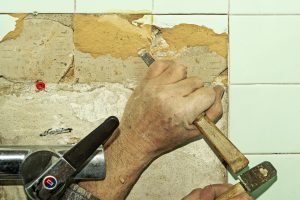Once the DIY bug bites, most homeowners are itching to dive headfirst into a renovation project. That means rolling up your sleeves, hitting the hardware store, and watching YouTube tutorials until you feel ready to conquer whichever section of your home needs a face lift. But if your home was built before the 1990’s, project preparation should involve one crucial additional step: asbestos awareness.
How to Identify Asbestos during a Home Remodel Project
 Know your home. Unless your house is the site of some important Atlanta history, you probably haven’t spent much time thinking about its construction. But asbestos—and other toxic materials like lead—aren’t easily recognizable to the untrained eye. Before beginning your DIY remodel project, do your homework. Learn when your home was built. Investigate past remodeling projects. If information isn’t readily available, consider bringing in an asbestos remediation specialist to identify any potential dangers.
Know your home. Unless your house is the site of some important Atlanta history, you probably haven’t spent much time thinking about its construction. But asbestos—and other toxic materials like lead—aren’t easily recognizable to the untrained eye. Before beginning your DIY remodel project, do your homework. Learn when your home was built. Investigate past remodeling projects. If information isn’t readily available, consider bringing in an asbestos remediation specialist to identify any potential dangers. - Know your materials. Damaged asbestos fibers usually appear as white, gray, or blue fibers that are frayed and string-like. Unfortunately, if you’re close enough to identify asbestos, it means you’ve already been exposed to the microscopic fibers that cause long term health problems. Before starting any project, learn which building materials are most likely to contain asbestos. Be wary of these materials, especially if they’re cracked, crumbling, or damaged:
- Insulation around furnaces, pipes, stoves, and HVAC systems
- Vinyl and linoleum tiles and adhesives
- Outdoor siding, shingles, and roofing materials
- Drywall patching and joint compound
- Soundproofing or decorative plaster
- Caulking and window glazes
- Act like every project contains the risk of asbestos exposure. Even if you’re sure your home is asbestos-free, it pays to play it safe. Always wear proper safety equipment—including goggles, gloves, full-coverage clothing, and a face mask—when renovating your home.
Did your DIY project uncover bigger problems than you wanted? Never attempt to tackle asbestos problems yourself. For your safety and the safety of your family, always consult a professional asbestos removal company.
For more information about finding asbestos in remodeling projects, contact Clean Environmental Group.
